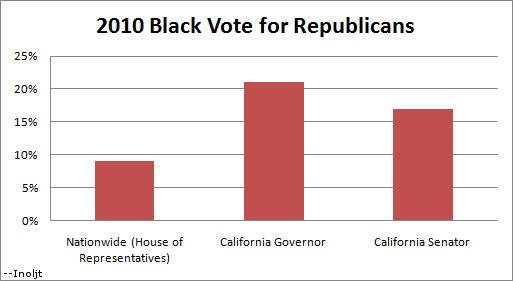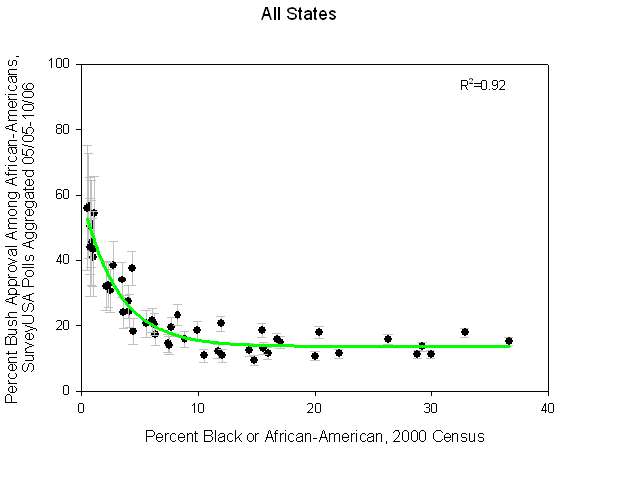By: Inoljt, http://mypolitikal.com/
The black vote is one of the most reliably Democratic constituencies out there. Blacks commonly give Democratic candidates more than 90% of the vote; Democratic presidential candidates in 2000, 2004, and 2008 won 90%, 89%, and 95% of blacks respectively.
Blacks were as reliably Democratic as ever in the 2010 midterm elections. The black vote undoubtedly saved many a Democrat from defeat. Exit polls indicate that 89% of blacks nationwide voted for a Democratic congressman.
In California, however, blacks seemed to have been quite a bit more Republican than this.
More below.
The table below indicates the black support, according to exit polls, gained by Republicans in California’s statewide races:
| 2010 Black Vote | Democratic | Republican |
| Nationwide (House of Representatives) | 89 | 9 |
| California Governor | 77 | 21 |
| California Senator | 80 | 17 |
This can be graphed as below:
Now, a word of caution before analyzing these results: exit polls are notoriously unreliable. It is entirely possible that a bad sample skewed these results (although since it appears that the polls for the two California races were separately done, this may be less likely).
If the exit polls prove correct, however, California blacks voted significantly more Republican than blacks elsewhere in the nation. Generally speaking, it is quite a feat for a Republican to get more than 15% of the black vote.
Yet in 2010 Republican candidates in California did this twice. These were not especially impressive candidates; both lost pretty badly. Nevertheless, they got a degree of black support one would only expect Republican to pull during a landslide victory.
Whether this degree of black support is something recent, or whether blacks in California have always voted this way, is hard to tell. According to exit polls, in 2008 they gave 94% of the vote to the Democratic candidate. In 2004 they gave 86% of the vote for Democratic Senator Barbara Boxer (this was an election she won by a landslide). On the other hand, in 2004 a relatively paltry 70% voted for Democratic gubernatorial candidate Phil Angelides (who lost by a landslide). To round these numbers up, Senator John Kerry got 81% of the black vote that year.
Looking at the results does seem to indicate that blacks in California have been consistently more Republican than blacks nationwide, if not to the extent they were in 2010.
There are several reasons why this might have happened. Several years ago a blogger named dreaminonempty did a fascinating analysis, in which (s)he found that the blacks living in extremely non-black states tended to support Democrats less. For instance, blacks residing in states with higher black populations were more disapproving of President George W. Bush. This was the graph the blogger created:
Califonia is a state with a relatively low black population. Moreover, blacks in California are unusually integrated and getting more so. Places traditionally associated with the black community are rapidly diversifying. For instance, today Oakland is barely more than one-fourth black and Compton is less than one-third black.
California, then, constitutes a good example of dreaminonempty’s hypothesis. Its relatively racially integrated communities may have something to do with a less monolithically Democratic black vote.
Republicans should not start celebrating yet, however. Their relative strength amongst the black vote has very little to do with Republican success at appealing to minorities, and much more to do with the characteristics of California’s black community. If the party is ever to regain competitiveness in California, it must begin reaching out to minorities. Judging by the 2010 election results, this is still a challenge the party has yet to overcome.


Any poll that has a Republican getting more than 15% of the black vote is simply wrong. Period.
Most 2010 Exit Polls had Senate vs. Governor vote crosstabs. So obviously the people were asked both questions. I don’t see why they would have made an exception for Cali.
The 2010 electorate was more conservative everywhere, even though California was the best state for Democrats in the midterm, the electorate had lots more conservatives than regular years. Black voters weren’t energized like most others and many sat it out, so that can make the exit polls deceiving as far as trends go.
The black community has integrated into more diverse areas (the reason why places like Oakland are less black), but many of the places they are moving are trending more Democratic. The Bay Area and Sacramento suburbs, Antelope Valley and Inland Empire have seen increases in black population. Also, some have moved out of state, so that is a factor as well.
in California is relatively small and declining. Los Angeles now has a smaller (percentage-wise) black population than Las Vegas, and in a midterm election with low minority turnout, it’s hard to imagine it would be easy for exit pollsters to get a statistically significant sample of African-American voters in most precincts, and those that did would find a disproportionately GOP-friendly sample given the turnout dynamics at play in 2010.
when looking at this … even in states w/ a much higher black percentage of the population, the exit polls can be way off …
best example is Maryland in 2006 where exit polls showed Steele w/ 25% of black vote … in reality, he got no more than around 15%.
How does Prop. 8 factor into these? Many African-American churches are socially conservative. I wonder if African-Americans in California mirrored their brethren in Michigan and Ohio in 2004. Both of those states had ballot votes regarding the status of marriage which were overwhelmingly passed by the population.
voter patterns among minorities in CA? As an observor of politics of CA, from afar, for a long time here’s my two cents. In the late 1970’s and early 1980’s there was a huge upswing of influence of the AA community in CA on the state and local level. Mayor Tom Bradley was the king of LA and nearly became Governor in 1982. In 1978 Yvonne Braithwaite Burke seemed a shoo in for state AG. Jerry Brown’s strange re-election bid, IMO, upened her race that year. Of course Speaker Willie Brown became Speaker for life and dominated Sacramento in many ways. There was additional AA seats in congress after the 1982 census and it was clear to mean that the AA community in CA was going to be a powerful force to be reckoned with.
Somehow along the way the hispanic wave came to CA. In numbers and emphasis the democratic party has changed and clearly the hispanic minority community has clearly supplanted the AA community in power and influence. For instance last year it as clear to me that Brown & Boxer pitched nearly a greater emphasis in their campaigns towards the hispanic community. In statewide races and in legislative leadership positions the hispanic community has raced ahead.
Is there tensions between the two communities? In LA Mayor races we have seen hispanic candidates against AA backed candidates. In several key primaries we have seen AA voters choose either a white or asian candidate over the hispanic candidate. In GE’s they may vote the same but within the party I see a lot of tension. How will this impact things? Not sure.